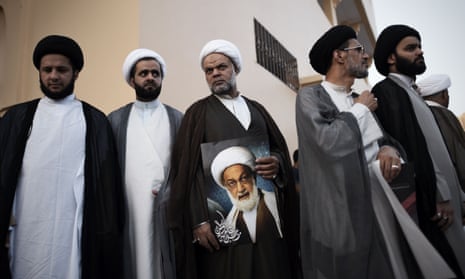Vice-president Joe Biden called Bahrain’s King Hamad bin Isa al-Khalifa to express “strong concerns”, the White House said late on Friday, alluding to a political crisis in the tiny island kingdom that threatens its close ties to the US, Saudi Arabia and other Gulf states.
In a description of the call, the White House said Biden and the king spoke of “recent negative developments in Bahrain and their implications for the wider region”.
On Thursday, an explosion south of the Bahraini capital, Manama, killed a woman and injured her three children. A day later, police said the blast was a “terrorist bombing” in the village of Eker and said officers had begun an investigation.
Violence has increased in Bahrain as the Sunni monarchy has cracked down on dissent among factions of the majority Shia population. Recent bombings have been blamed on radical Shia opposition groups, which were largely driven underground after failed protests in 2011.
About 1,200 troops from Saudi Arabia and 800 from the United Arab Emirates helped quash that uprising, which threatened to upend Bahrain as an Egyptian revolt had overthrown its government a month before.
In recent months, the Bahraini government has stripped away the citizenship of 250 people, including the country’s most prominent Shia cleric; suspended the largest Shia opposition group and extended a prison term for its leader; kept activists out of a United Nations human rights meeting; and rearrested a human rights activist for spreading “false news”.
The UN secretary general, Ban Ki-moon, and his rights chief have called on Bahrain to respect human rights.
The US relies on Bahrain to house the navy’s fifth fleet. After a brief ban on military aid in 2011, it resumed selling ammunition, helicopters and military equipment to the kingdom.
Earlier this week, a group of senators, prompted by a state department report that found Bahrain had failed to enact reforms, urged Barack Obama to rethink the US arms deal with the kingdom.
In a letter to the secretary of state, John Kerry, the senators wrote: “Bahrain’s failure to address the legitimate grievances of its citizens has strained the country’s social fabric and invited outside actors to take advantage of the deteriorating situation.”
Lawmakers including the Democratic Oregon senator Ron Wyden introduced a bill to ban sales of weapons and riot control equipment to Bahrain until the country launches reforms, such as integrating its “Sunnis-only” security forces, commuting the sentences of political prisoners and ending all sanctioned and unsanctioned torture.
That political crisis “could quickly intensify and destabilize an important United States ally”, the senators warned. “Indeed, we believe the government’s harsh crackdown on the political opposition undermines the country’s stability and plays into the hands of Iran.”
While the 2011 uprisings were bolstered by pro-democratic sentiment around the Middle East, more recent protests and crackdowns have taken sectarian tinges. Bahrain is closely allied with Saudi Arabia, the dominant Sunni presence of the Middle East, and at odds with the dominant Shia force, Iran.
In June, one of Iran’s most powerful generals warned that Bahrain’s crackdown could “set the region on fire”.
On Thursday, a state department spokesperson, John Kirby, told reporters the Obama administration remained concerned about how the weapons it sells will be used.
“We continue to urge the government of Bahrain to reverse their recent harmful actions,” he said.
According to the White House, Biden made similar entreaties.
“The Vice President emphasized the importance of reducing ongoing tensions through dialogue and reconciliation with the opposition, and a commitment to reform,” its statement said.
